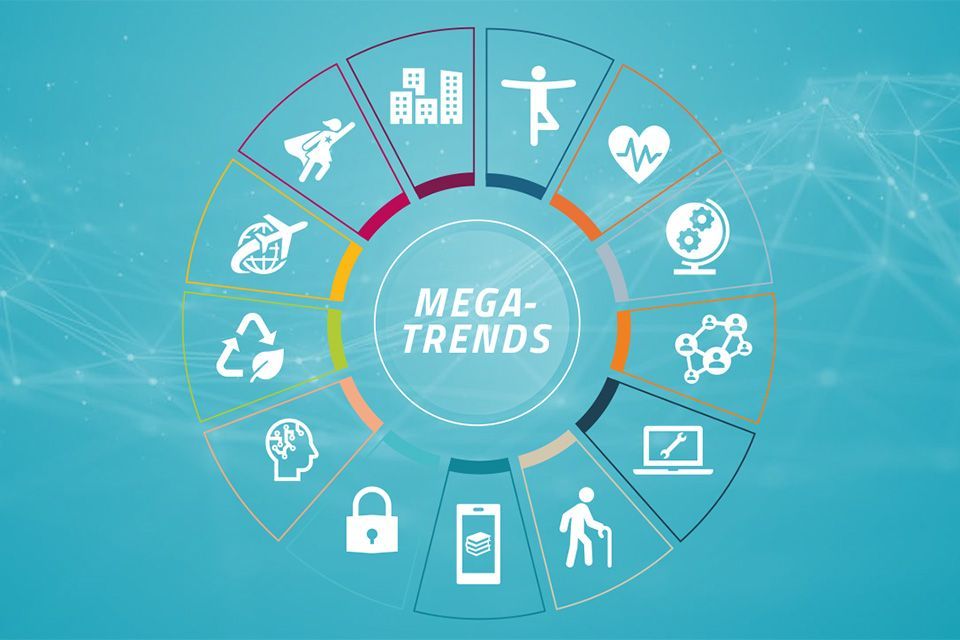Conferences
Future Meeting Space: disappearing and emerging conference services

The 2024 research phase of the long-term Future Meeting Space (FMS) project evaluated 13 megatrends influencing the business events ecosystem. It was determined which current services and formats will lose importance and which services will emerge, based on the most significant ones.
An initiative of the GCB German Convention Bureau and Fraunhofer IAO, the Future Meeting Space project has been researching the future of business meetings since 2015. Their aim is to identify trends and developments that impact the live communication sector and provide practical recommendations to companies and organisations active in it.
In 2024, the FMS project focused on which processes, products and services will remain, disappear, or emerge in the business meetings ecosystem. Thirteen megatrends were analysed, including automation, urbanisation, sustainability, AI, demographic changes, and new kinds of work.
First, a heatmap was created, a visual overview of the impact that the various megatrends have on the different phases of the organisational process. AI, sustainability, and demographic change emerged as ‘hot spots’, or major trends.
Subsequently, it was determined which processes, products, and services for setting up business meetings would remain, which would disappear, and which would emerge.
Losing importance
Standard, repetitive tasks and services that can be easily automated will largely disappear, the researchers claim. For example, simple registration processes, standard communication, and administrative tasks that can be performed by AI and automation more efficiently and for less.
They also expect traditional, in-person-only formats to lose importance. The rise of hybrid and virtual events means there is less need for purely in-person meetings without digital components.
Generic services and formats will also fade into the background. The offering must respond to new and more personal client needs and expectations. For example, more varied and personal catering, customised event design and alternatives to the classic plenary sessions without interactive or digital elements.
Lastly, the researchers argue that business models that fail to keep up with technical and social advances will be replaced by innovative, data-driven, and more personalised alternatives. Examples include traditional event marketing without digital analysis and classic sponsorship models that do not use new technologies or data.
New services
The 2024 research phase of the Future Meeting Space project also identified and empirically evaluated several new services and business models that will enrich the event ecosystem in the coming years.
One of the new services is ExpertDetect, a digital platform that can quickly detect and match the right speakers and experts to events using data and AI, based on content, target audience, and current trends.
Another new service is EventTwin, a tool that creates a digital twin of an event. It allows organisers to plan, simulate, and optimise the entire event in a virtual environment before it actually takes place. As a result, it increases efficiency, reduces risks, and enables better decision-making.
In the top three of the researchers there is also LearnLoop, systems that automatically send personalised learning modules, summaries and ‘knowledge nuggets’ to participants, both during and after the event. As a result, it ensures better knowledge transfer and long-term engagement.
New matchmaking services are also taking off, using AI to connect attendees, exhibitors, and speakers based on interests, behaviour, and goals, making networking much more effective and personalised.
Given the importance of sustainability, the researchers anticipate more automated sustainability and impact monitoring tools. For example, services that measure, report and optimise the ecological and social impact of events using real-time carbon footprint analyses and data-driven sustainability advice.
Hybrid and remote event support also plays into some of the megatrends. According to the FMS report, innovative solutions are emerging to facilitate hybrid events, including virtual event assistants, remote production and interactive tools that provide an equal experience for both in-person and online attendees.
Finally, the researchers mention AI-driven content creation and curation. The future is automating the composition, personalisation, and distribution of event content, such as programmes, newsletters, and social media updates, tailored to the preferences of different target groups.
Key questions for 2025
In 2025, the focus of the FMS project shifted to the interaction between two dominant megatrends: demographic change and the rise of AI and automation.
The researchers are looking at how demographic changes, such as an ageing population and staff shortages, influence the organisation of business meetings.
In terms of technology, the key question is which tasks and processes can AI and automation take over without compromising the quality and experience of events? And which new skills are needed in a changing sector? How can organisations efficiently deploy and train their staff?
And then, there’s the rather philosophical matter of how humans and technology can collaborate optimally and in which circumstances the human aspect remains essential.
The ultimate goal of the 2025 research phase is to develop strategies that allow organisations to address the shortage of qualified personnel while also capitalising on the potential of automation.
FMS 2024 report
The GCB Future Meeting Space is now in its tenth year and has become an important trend barometer for organising business meetings, providing new insights annually that can be directly applied in practice.
The developments explored in depth in 2024 focus on the smart combination of human talent and technological innovation, with a focus on social trends such as ageing, sustainability and changing working methods.
The research results are available for free as a management report on the GCB website.
Megatrends
- Individualization and self-realization
- (de)globalization and geopolitics
- Health and mindfulness
- Digitalization and connectivity
- New work and work-life integration
- Lifelong learning and knowledge transfer
- Demographic change
- Security and data protection
- Automation and artificial intelligence
- Diversity and gender shift
- Neo-ecology and sustainability
- Urbanization and smart cities
- Mobility and autonomous driving
Deel dit bericht
Reacties
Er zijn nog geen reacties.
Plaats een reactie
Je moet ingelogd zijn om een reactie te plaatsen.
